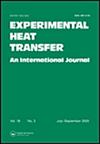用液晶热成像和反演方法估计传热问题中非均匀发热率的系统方法
IF 2.9
3区 工程技术
Q2 ENGINEERING, MECHANICAL
引用次数: 1
摘要
摘要本文提出了一种利用平板组件上的稳态共轭传热实验来估计平板组件内非均匀发热参数的逆方法(函数估计)。在水平风洞上对平板组件进行了稳态层流共轭强迫对流实验,用逆方法估计了平板组件内非均匀发热的参数。逆方法采用基于贝叶斯推理的Metropolis Hastings–Markov Chain Monte Carlo(MH–MCMC)算法和实验温度。使用液晶热成像在平板组件的方便位置测量实验温度。为了完成检索,首先,仅在软木材料上进行稳态实验,以准确估计软木材料的热导率,用于估计发热率,从而使软木材料热导率的不确定性导致的额外误差不会影响我们估计发热率的最终目标。在此之后,对软木装置(由一个非均匀发热加热器和两个对称软木板组成)进行稳态实验,以使用测量的温度和基本速率定律来确定加热器的发热性质。使用耦合人工神经网络(ANN)和Levenberg-Marquardt(LM)算法生成先验,用于贝叶斯推理。使用具有先验的贝叶斯推断,然后根据具有标准偏差的平均值、最大后验值来估计非均匀发热的参数。最后,利用检索到的非均匀发热参数来估计模拟的热功率和温度。这些与测得的热功率和温度进行了很好的比较。最后,提供了一种解决实际问题的方法,其中只有测量的温度可用。本文章由计算机程序翻译,如有差异,请以英文原文为准。
Systematic approach to estimate non-uniform heat generation rate in heat transfer problems using liquid crystal thermography and inverse methodology
ABSTRACT This paper presents an inverse methodology to estimate the parameters of the non-uniform heat generation (function estimation) within a flat plate assembly using steady-state conjugate heat transfer experiments on the flat plate assembly. Steady-state laminar conjugate forced convection experiments on a flat plate assembly are conducted on a horizontal wind tunnel to estimate the parameters of the non-uniform heat generation within flat plate assembly using the inverse methodology. Bayesian inference based Metropolis Hastings–Markov Chain Monte Carlo (MH–MCMC) algorithm and experimental temperatures are employed in the inverse methodology. The experimental temperatures are measured at convenient locations of the flat plate assembly using liquid crystal thermography. In order to accomplish the retrieval, first, steady-state experiments on only the cork material are conducted to estimate the thermal conductivity of the cork material accurately for use in the estimation of the heat generation rate so that the additional error due to uncertainty in the thermal conductivity of the cork material does not affect our final goal of estimating heat generation rate. Following this, steady-state experiments on the cork setup (consisting of a non-uniform heat generation heater and two symmetric cork plates) are conducted to ascertain the nature of heat generation of the heater using measured temperatures and fundamental rate laws. The priors are generated using coupled artificial neural network (ANN) and Levenberg–Marquardt (LM) algorithm for Bayesian inference. Using the Bayesian inference with priors, the parameters of non-uniform heat generation are then estimated in terms of the mean, maximum a posteriori with standard deviation. Finally, the simulated heat powers and temperatures are estimated with retrieved parameters of the non-uniform heat generation. These compared very well with the measured heat powers and temperatures. Finally, a recipe for solving a practical problem, in which only measured temperatures are available, is provided.
求助全文
通过发布文献求助,成功后即可免费获取论文全文。
去求助
来源期刊

Experimental Heat Transfer
工程技术-工程:机械
CiteScore
6.30
自引率
37.10%
发文量
61
审稿时长
>12 weeks
期刊介绍:
Experimental Heat Transfer provides a forum for experimentally based high quality research articles and communications in the general area of heat-mass transfer and the related energy fields.
In addition to the established multifaceted areas of heat transfer and the associated thermal energy conversion, transport, and storage, the journal also communicates contributions from new and emerging areas of research such as micro- and nanoscale science and technology, life sciences and biomedical engineering, manufacturing processes, materials science, and engineering. Heat transfer plays an important role in all of these areas, particularly in the form of innovative experiments and systems for direct measurements and analysis, as well as to verify or complement theoretical models.
All submitted manuscripts are subject to initial appraisal by the Editor, and, if found suitable for further consideration, to peer review by independent, anonymous expert referees. All peer reviews are single blind and submission is online via ScholarOne Manuscripts. Original, normal size articles, as well as technical notes are considered. Review articles require previous communication and approval by the Editor before submission for further consideration.
 求助内容:
求助内容: 应助结果提醒方式:
应助结果提醒方式:


